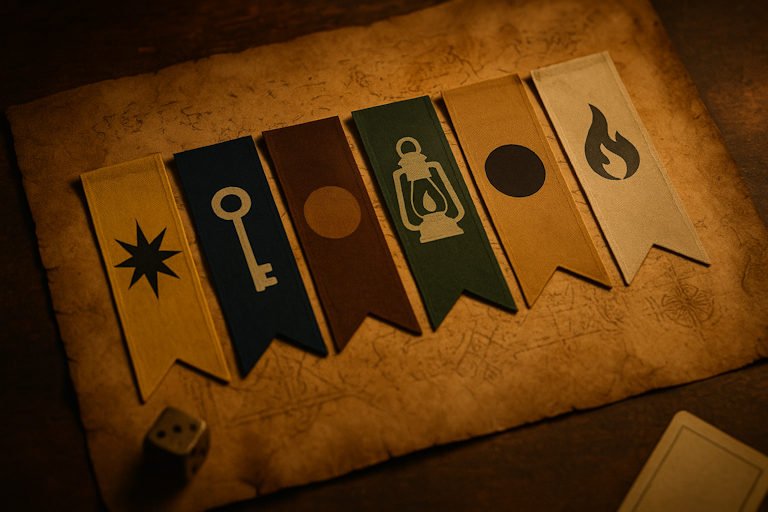
Storytelling in games: unlocking unforgettable nights of suspense (2025)
Storytelling in games is what separates a routine evening from an unforgettable one. Rules and mechanics may set the stage, but it is the narrative that gives every move weight. A well-told story turns competition into drama, cooperation into adventure, and outcomes into lasting memories.
What makes story so powerful is its ability to create suspense. A roll of the dice becomes a cliffhanger. A hidden card feels like a secret waiting to be revealed. With each turn, storytelling builds anticipation, pulling players deeper into the moment.
In this article, we explore why storytelling in games matters, how it creates tension around the table, and why even the simplest play becomes extraordinary when wrapped in a tale worth telling.
Storytelling in games: why it matters
Storytelling in games is what transforms a simple set of rules into a memorable experience. Points, dice, and turns may structure the evening, but it is the narrative wrapped around them that makes the night unforgettable. Without story, games risk feeling mechanical. With story, they become living worlds that players can step into.
One reason storytelling matters is emotional depth. A number on a score sheet can tell you who won, but a story explains why it mattered. A thief who betrays the group, a kingdom that falls at the roll of the dice, or a hero who triumphs against impossible odds—these moments carry emotion because they are framed as stories, not just outcomes.
Narrative also provides meaning. Humans are wired to seek patterns and connect events. Storytelling in games gives players a thread to follow, a reason for their actions, and a sense that their choices are part of something larger. Even the simplest mechanic—like moving a pawn—feels richer if it represents a character’s journey across dangerous lands.
Another strength is memory. Long after the rules are forgotten, people remember the story of the game. They recall the time a daring bluff saved the night or when a last-minute twist changed everything. These anecdotes become part of the group’s shared history, turning each game into more than entertainment: it becomes tradition.
Ultimately, storytelling in games matters because it bridges mechanics and meaning. It ensures that what players do is not only logical but also emotional, not only structured but also alive. And that is why a good story makes every game night worth remembering.

Uncover
The Firefly Inn
Behind its lantern light, secrets wait to be revealed. Step closer, and choose your path into the unknown.
How narrative creates suspense at the table
The essence of suspense lies in not knowing what comes next—and storytelling in games thrives on this uncertainty. Where mechanics provide structure, narrative provides anticipation. Together, they transform a simple move into a moment of tension that holds everyone’s attention.
One way narrative creates suspense is through cliffhangers. A story framed around each turn makes players eager to see what unfolds. Will the hidden card reveal a treasure or a trap? Will the dice roll bring salvation or disaster? Suspense builds because the outcome is no longer abstract—it matters to the story.
Foreshadowing also plays a key role. Subtle hints, repeated symbols, or whispered rumors set the stage for twists to come. Even if players do not consciously register these details, they sense that something is waiting. This silent expectation keeps them engaged long before the reveal.
Another factor is emotional investment. When characters, alliances, or worlds are wrapped in story, choices feel weightier. Moving a pawn becomes more than advancing a token; it is guiding a hero closer to triumph or peril. Each decision resonates because players care about the outcome beyond the mechanics.
Suspense also thrives on pacing. A well-timed pause, a deliberate reveal, or a sudden twist can shift the entire mood of the table. Storytelling gives designers and game masters the tools to control rhythm, stretching tension when needed and delivering catharsis at just the right moment.
Ultimately, storytelling in games creates suspense by turning uncertainty into drama. Players are not only calculating odds—they are living through moments of fear, hope, and surprise. That emotional engagement is what makes even a simple game night unforgettable.

Uncover
The Firefly Inn
Behind its lantern light, secrets wait to be revealed. Step closer, and choose your path into the unknown.
Five ways storytelling transforms a game night
Storytelling in games does more than entertain—it changes how players experience every moment. Here are five ways narrative reshapes an evening around the table:
- Setting the mood: A story establishes atmosphere before the first move. Whether eerie, adventurous, or lighthearted, it frames how players interpret every action.
- Creating shared memories: Stories give players anecdotes to retell. Long after the rules are forgotten, the tale of the bluff, betrayal, or twist remains part of the group’s history.
- Deepening emotional investment: When actions are tied to characters or worlds, players care more. Winning feels sweeter, and losing becomes part of a larger drama rather than a dead end.
- Guiding rhythm and suspense: Storytelling provides pacing, balancing quiet buildup with dramatic reveals. This rhythm keeps players engaged from start to finish.
- Making choices meaningful: A decision framed by story feels weightier than a simple move. Each choice becomes part of a narrative thread, giving players ownership of the outcome.

Together, these elements show why storytelling in games transforms ordinary evenings into unforgettable adventures—turning every table into a stage for lasting memories.
Tips for weaving story into play
The real magic of storytelling in games lies in how it builds anticipation. Every clue, every pause, and every twist heightens the tension until players lean forward, eager for the next revelation. Instead of a linear march to the end, story adds rhythm: moments of calm give way to sudden shocks, while subtle foreshadowing plants unease that blossoms later into surprise. This pacing keeps players hooked, never certain when the next turn of the tale will strike.
One simple tip is to use small narrative hooks. A single sentence of flavor text, a mysterious symbol on a card, or even the name of a location can give weight to otherwise ordinary mechanics. These touches make the experience feel less like a system and more like a world.
Another technique is variation in tone. Not every scene needs to be high drama; a lighthearted moment can make the darker beats hit harder. By shifting tone throughout play, storytelling keeps players emotionally engaged and prevents fatigue.
Foreshadowing is another powerful tool. Repeated symbols or vague warnings build a sense of inevitability. When the twist finally arrives, players feel rewarded for paying attention. Even if they never spotted the hints, the reveal feels earned because the seeds were already planted.
Finally, encourage player-driven storytelling. Games are most powerful when players add their own interpretations, jokes, or embellishments. A mechanic framed by a small story prompt often grows into a shared narrative that no designer could fully script. This collaborative layer ensures that every session feels unique and memorable.
When used thoughtfully, storytelling in games becomes more than an accessory—it is the heartbeat of suspense. It gives meaning to mechanics, binds groups together, and ensures that even the smallest choices feel alive with possibility.
Conclusion – Storytelling in games as the heart of suspense
At its core, storytelling in games is what transforms rules into experiences. Dice, cards, and points may set the framework, but narrative gives them life. It is the story that makes a roll of the dice feel like destiny, that makes a hidden card feel like a secret, and that makes a simple move across the board feel like a heroic leap. Without story, games risk being forgettable. With story, they become nights that linger in memory.
What makes storytelling so powerful is its ability to create suspense. Every hint, every pause, every cliffhanger pulls players closer. A game without story can be clever, but a game with story is compelling—it demands attention, sparks emotion, and keeps people invested until the very end.
Storytelling also turns outcomes into shared history. Groups don’t retell the math of their victories; they retell the moments of betrayal, the narrow escape, the shocking twist that no one saw coming. These narratives outlast the session itself, becoming part of the group’s identity and tradition.
For designers, the lesson is clear: weave story carefully into mechanics. For players, the takeaway is just as important: embrace narrative, because it elevates every choice and every victory.
Ultimately, storytelling in games is not an accessory but a heartbeat. It is the invisible thread that binds rules to meaning, and suspense to memory. It ensures that each game night is more than competition—it becomes an unforgettable story worth telling again.

Uncover
The Firefly Inn
Behind its lantern light, secrets wait to be revealed. Step closer, and choose your path into the unknown.




